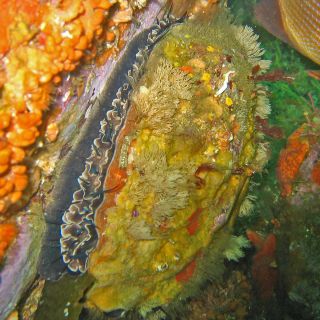Animal Behavior
Even Giant Sea Snails Suffer From Transgenerational Stress
Ocean acidification by humans decreases growth and reproduction for red abalone.
Posted December 9, 2023 Reviewed by Abigail Fagan

I'm always looking for "surprises" in animal behavior and how environmental conditions can influence behavior and physiology over many different generations. Researchers often cash out these effects as "epigenetic transgenerational inheritance," and while this phenomenon is well known in a large number of animals, including humans, namely that stressful childhoods can have influence later generations, who would have expected it to occur among invertebrates?1 This is precisely why a detailed long-term study of giant sea snails, red abalone, published in the journal Global Change Biology by University of California (at Davis) researcher Dr. Isabelle Neylan and her colleagues titled "Within- and transgenerational stress legacy effects of ocean acidification on red abalone (Haliotis rufescens) growth and survival" caught my eye.
I honestly had never thought much about the transmission of stress across generations in these or other invertebrates. To lay the foundation for the research that was done and the conclusions that can be reached, Holly Large writes, "Going through stressful events at a young age can sometimes have a lasting impact on our own lives and the generations that come after us. But that’s not a uniquely human phenomenon – researchers have discovered a similar pattern in red abalone, with a legacy of stress created after exposure to ocean acidification."
How transgenerational trauma was studied in red abalone and what researchers learned
Dr. Neylan and her colleagues conducted a long-term, detailed study of red abalone to see if and how they were effected by climate change. They write, "We investigated plasticity across generations and life stages in response to ocean acidification (OA), which poses a growing threat to both wild populations and the sustainable aquaculture of shellfish." They were especially concerned with long-term carryover effects of OA within and across generations.
To do the research they conducted their study over five years using a multi-generational split-brood experiment, in which they spawned adult red abalone and exposed half their offspring to current levels of OA and half to highly acidic OA for the first three months of life. They then raised the survivors for four years, exposed these adults to high and low levels of OA for 11 months, and measured their reproductive potential (fecundity). Kat Kerlin summarizes the research as follows:
"The scientists found that early-life exposure to ocean acidification decreased the abalones’ adult growth rate even after five years, especially when re-exposed as adults. Ocean acidification reduced the ability of adults to reproduce, even for those not exposed as babies. Also, the negative effects the parents experienced carried over to reduce the survival and growth of the next generation."
All in all, adults were pretty resistant to OA and youngsters were most vulnerable. Isabelle Neylan says, "We were looking to see if your parent was exposed, does it buffer you from the impacts? That wasn't the case...The more you get hit, the worse it is, but there are glimmers of hope."
Who would have ever imagined snails would experience anthropogenic transgenerational trauma?
Red abalone are a critically endangered species, These edible sea snails have long lives—they can live upwards of 50 years—and are considered a "California icon" as an important source of food for Native coastal people. Their fate has widespread consequences for numerous people.
This study and the results opened my eyes to a phenomenon I never imaged existed because of my lack of familiarity with these sorts of animals. It's not only vertebrates who are strongly influenced by environmental conditions. Animals with whom many are unfamiliar or who are thought to be hard-wired to have certain sorts of lives also are vulnerable to human produced—anthropogenic—poisoning of their homes.
I hope this study opens others' eyes and more attention is paid to animals who often are written off as being resistant to human intrusions into their lives or couldn't possibly be so sensitive to what we're doing to the habitats in which they live. Clearly, they're not passive recipients of our trespassing into their lives over many generations, and they and we pay for our indiscretions.
I marvel at what we learn when we put aside unfounded preconceptions and prejudices about species about whom we know nothing or very little, and actually study how they respond to our intrusions into their lives. We are all interconnected in one way or another and when they (other animals) suffer, we do too.
References
1) A discussion of the word "epigenetic" can be found in this essay. Loosely put, "Epigenetics explains how early experiences can have lifelong effects."


